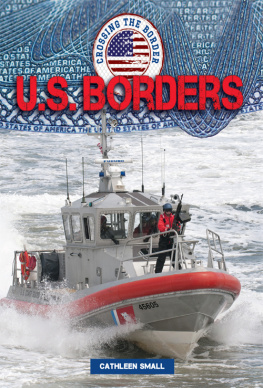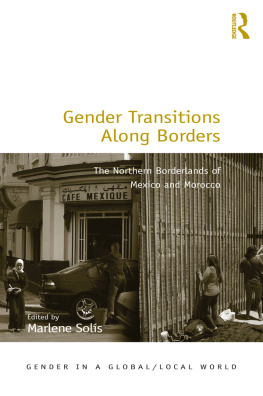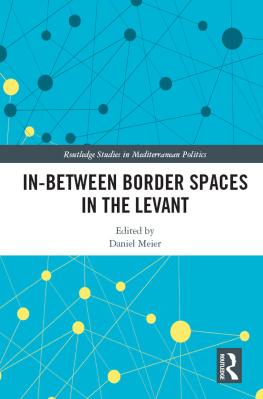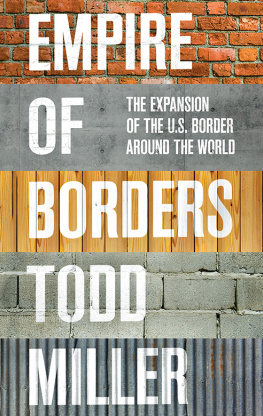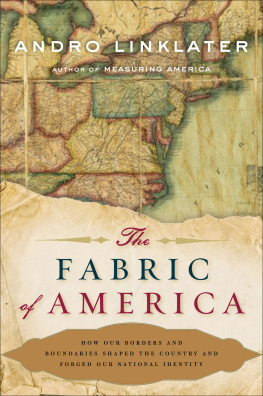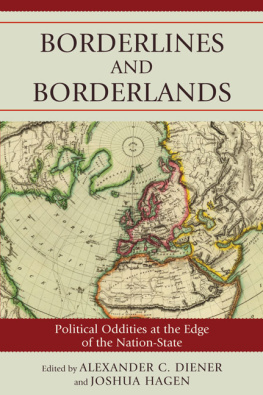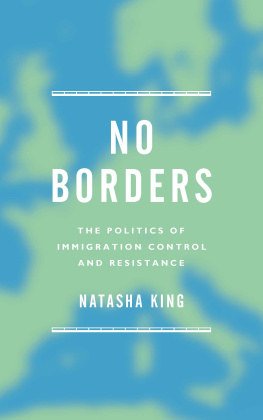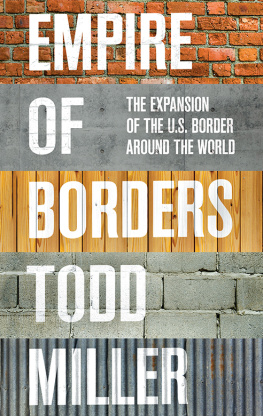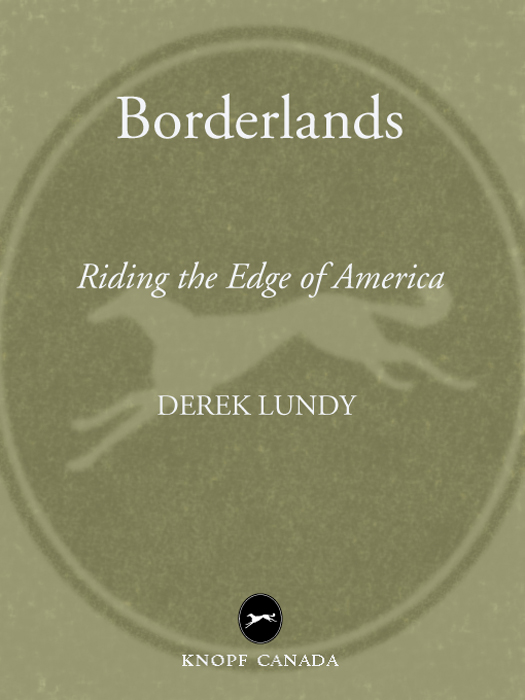ALSO BY DEREK LUNDY
Scott Turow: Meeting the Enemy
Godforsaken Sea: Racing the Worlds Most Dangerous Waters
The Way of a Ship: A Square-Rigger Voyage in the Last Days of Sail
The Bloody Red Hand: A Journey Through Truth, Myth and Terror in Northern Ireland
In memory of Will Walker,
Mike Fitz-James, and Chris Burke
TABLE OF CONTENTS
PART I
SOUTH
PART II
NORTH
AUTHORS NOTE
Miles or kilometres? A minor, but pesky, problem when one is writing about the United States and the metric countries Canada and Mexico. It seemed artificial to use metric distances in the U.S., and wrong to use miles anywhere else. Therefore, the description of distances in this book follows road map convention. I use miles and yards when Im in the United States, and kilometres and metres when Im in Mexico or Canada.
PROLOGUE
AND WE A MERICANS ARE THE PECULIAR,
CHOSEN PEOPLE WE BEAR THE ARK OF THE
LIBERTIES OF THE WORLD.
HERMAN MELVILLE, White-Jacket
WHEN CANADIANS TALK ABOUT THE BORDER, we mean only one thing: the long, ambiguous, fragile line that separates us from the United States.
The border with the United States has always been of the utmost importance to Canadians. It is essential to our identity as not-American. It has separated us, with tenuous success, from the political, military and cultural juggernaut next door. The 49th parallel is a symbol of all the complex, and contradictory, feelings that Canadians hold about the United States: fear, fascination, superiority, inferiority, admiration, contempt. Some of these emotions are the common response of any small nation-state to the imperial world power of the day. But for Canadiansclose-by, both threatened and protectedAmerica is an obsession.
There is no intellectual symmetry between the two countries awareness of each other. Canadians (like Mexicans) have no alternative but to know a great deal about the United States. Americans could afford to know next to nothing about Canadaat least until now. One Canadian historian aphorized: Americans are benignly ignorant of Canada. Canadians are malevolently well informed about the United States.
Now that imbalance is beginning to change. American administrations and politicians, consumed with security, are slowly giving up their indulgent indifference to Canada. If Canadians have always complained about American ignorance of their country, they may already regret the new closer attention being paid them.
The border divides the two biggest trading partners in the world, and the trading relationship demands the fast, easy flow of goods and services in both directions. Since the terrorist attacks of September 11, 2001, however, the United States has slowly and steadily choked the flux of trade both ways. The border is thickening. Things are slowing down; just-in-time parts shipments are in jeopardy; trucks must wait for inspection and clearance; people must be questioned.
The border cant be both things: a goods-and-services conduit and a security perimeter. One form must trump the other, and theres little doubt that security will win out. The United States Department of Homeland Security will see to it. This will be the case in the near future, even if no terrorist attack on the United States originates in Canada. The idea of an open, and undefended, border will become a wistful memory.
Whatever happens south of the border is always of intense interest to Canadians, but now another boundary is also coming into play. We must get used to the idea that events along the U.S.-Mexico border have their notable consequences in Canada as well.
Consider two recent events.
In early 2009, gangsters in Vancouver and its suburbs began shooting and killing each other in much larger numbers than usual. They gunned down rivals in busy city streets at nine in the morning while civilians dropped for cover; they hosed SUVS and flashy sedans with automatic gunfire as if they were in Baghdad or Sri Lanka; they slaughtered hitherto exempt women in front of their young children. In the first months of that year, it seemed as if the bad guys had taken over the streets of the city that a United Nations survey the previous year had nominated the most livable in the world.
The police and the experts agreed that Vancouver gangbangers were attacking each other much more than usual because of what was happening three thousand kilometres away in another country. Mexicos drug cartels were fighting for supremacy at home. The ferocity of the drug wars had already spilled over the line into the United States, and had leapfrogged far to the north over Canadas border as well. When the Gulf Cartels hired assassins massacre rivals in Ciudad Jurez or in Chihuahua City, and when Sinaloa or Tijuana killers retaliate, they begin a chain of causation that ends with blood and fear in the beautiful west-coast Canadian city.
The Mexican cartels are fighting each other; but theyre also fighting the Mexican army and the federal police, which is bad for their business. The cartels inventory becomes depleted, or they must use time and energy in hostilities that interfere with the reliable supply of their much desired product. The flow of drugs north to Canada is slowed, diverted or dammed. When demand exceeds supply, entrepreneurial competition increases. The Vancouver gangs react to the shortened supply of drugs by fighting harder for the stuffand for the territory they need to control to sell it.
A second striking event for Canadians took place in April 2009. In an interview in Washington with a reporter for the Canadian Broadcasting Corporation, Janet Napolitano, the then-newly appointed head of the Department of Homeland Security, clearly implied she believed that all, or some, of the 9/11 hijackers had entered the United States from Canada. (Not so; all had entered the United States from overseas on legal visas.)
To the extent that terrorists have come into our country or suspected or known terrorists have entered our country across a border, its been across the Canadian border, she said.
The Canadian interviewer, Neil Macdonald, asked: Are you talking about the 9/11 perpetrators?
Not just those, but others as well, Napolitano replied.
Macdonald gave her another chance. He mentioned the prominent American politicians, including Hillary Clinton when she was a senator, who had accused Canada of harbouring the 9/11 terrorists and of allowing them to enter the United States. Why is this misconception so common in the U.S.? he asked.
Napolitano ignored the opportunity to retract or to amend her statement.
Im not privileged to say everything that has occurred. I mean some things have occurred in the past. I cant talk to that. I can talk about the future.
She mentioned more terrorists and implied that other, unnamed, bad guys had tried to attack the United States from Canada, but that her department had headed them offno thanks to the Canadians, as usual. It was the worst sort of accusation: her suggestion that Canada had put the United States in mortal danger; her refusal, in the name of national-security secrecy, to divulge details. How does one refute such vague, yet devastating, innuendo? Napolitanos office later explained her statements by denying she had meant what she said.
It wasnt just the big 9/11 lie that rankled; it was also the lack of any awareness of Canadian sensitivity about it. Napolitano wasnt only saying that Canada was guilty of lax security; she was also speaking as though the country had no substance for her, no reality as a separate, and physically huge, North American presence.



